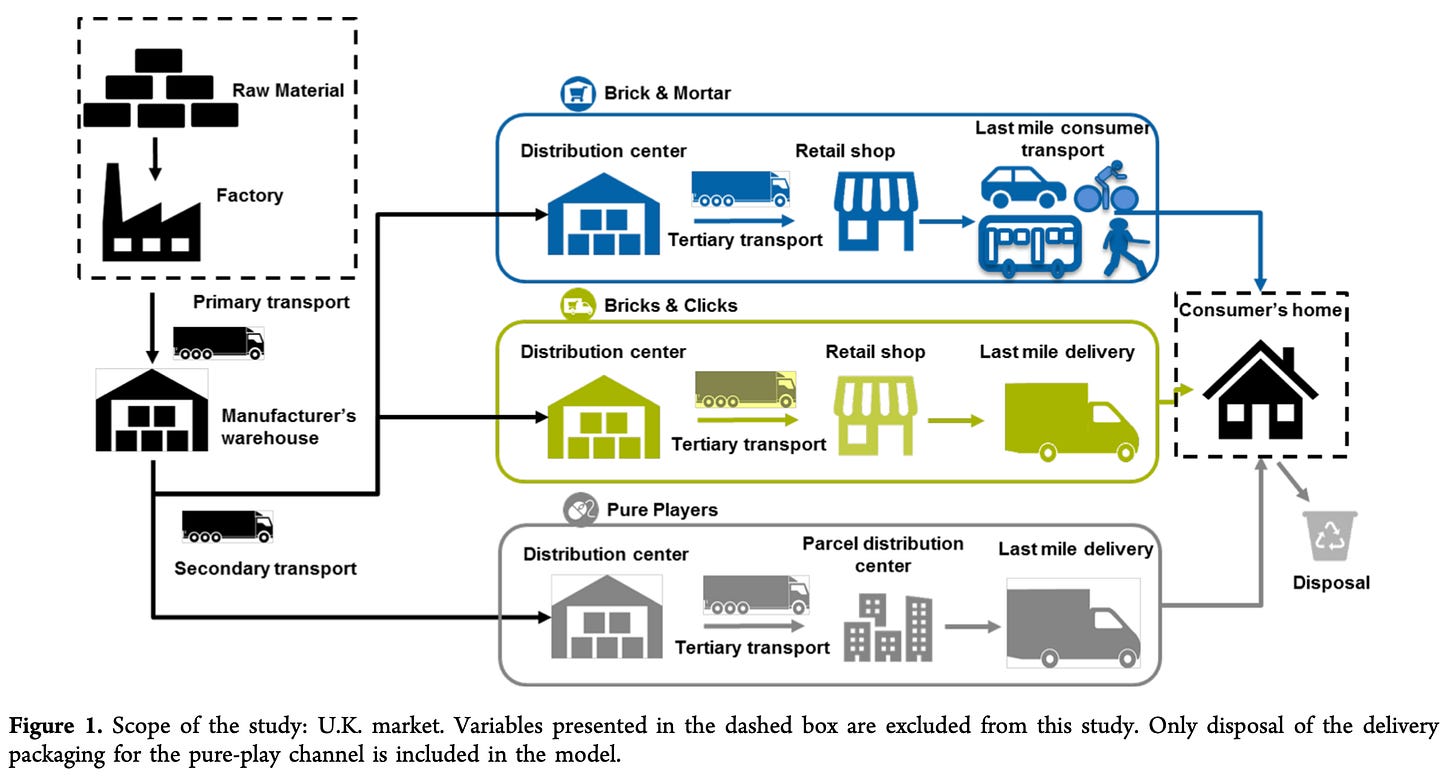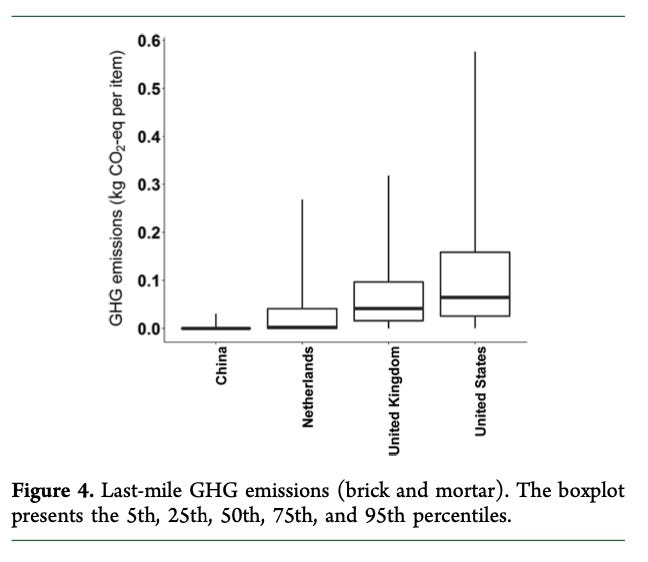Another Brick in the Wall
Welcome to "nouveau monde", sort of a "nouveau genre" newsletter to better understand how to make the world better through the lens of retail. This is #15!
We’re talking this week about a new research giving more insights about the most sustainable shopping options, and put a focus on Loblaws, a Canadian retailer, telling you more about its commitments and real actions regarding sustainability.
Read, like, share, subscribe :-)
Today's newsletter is 1070 words, a 7-minute read.
The most sustainable delivery option : “bricks & clicks”
by Anthony
In the past, some studies showed delivery was better than shopping in regards of Green House Gas (GHG) emissions. But theses studies were quite old, the most recent research paper was from 2013, and as you know, tech and retail is moving fast.
It's great to see that a news study has been conducted and published recently in Environmental Science and Technology.
What are the key findings ?
The study focuses on FMCGs (Fast Moving Consumer Goods, personal care and homecare products) in the UK and the authors remind us that each country would have a different results, as the population has a different behavior. For instance, for the brick and mortar, there as a 1 to 30 difference between China and the US (from almost 0 in China to 65 g of CO2 per item in the US).
So, according to the study, the best way to get FMCGs if you mind about GHG would be what they call "Bricks and clicks" : a traditional fullfilment of retail stores next to consumers then a van delivery. What is surprising is that in this case, pure player (let's say Amazon shopping, eveni if Amazon is not named in this study) is by far the worst case :
0,18 Kg of CO2 par item for pure player shopping
0,10 Kg of CO2 par item for traditional shopping
0,07 Kg of CO2 par item for bricks and clicks
Let's have in mind that the limit of the study is that people don't anly buy FMCGs and that if purchased during other types of shopping the traditional shopping would have a better score.
But, we can see other interesting facts in the study. For instance, the variability of results. Let's have a look at the variance (what has the potential to change the results) for each type of shopping :
For the traditionnal shopping, it is mostly basket size then distance then the mode of transport.
For Bricks and clicks, it's mainly basket size, then emission intensity of the vehicle, then the last mile distance. This means that bricks and clicks has a potential to decrease its impact if it uses more decarbonized vehicles.
Then, for pure players, we can see that the basket size has a lower impact. The biggest percentage is the stem mileage (distance between the depot and the delivery zone), then from the delivery zone to the customer. Then the number of deliveries per tour and finally the failed deliveries. Which, debunk an old belief : failed deliveries (at least in this case) are not the most impactful regarding GHG (maybe still regarding the cost for the retailer...)
You know I like alternative ways to deliver, especially cargo bikes. Well, the study had a look at this mode of transport and found out that the use of a cargo bike for a pure player could reduce by 0,02 to 0,11 Kg of CO2 per item, so potentially reduce by half the GHG total of deliveries coming from warehouses.
Another key fact, which is obvious but should be recalled and be put forwoard by retailers is the fact that bulk or group purchasing has a huge impact both on the price and on the GHG emissions. Occidental retailers should have a look at what's happening in China where Meituan and Pinduoduo both promote fresh groceries grouping purchasing. This enable them to continue their expansion out of the first-tier cities.
What it means for a Retailer to be sustainable
by Phil
Loblaw is a Canadian Retailer, headquartered in Toronto, operates more than 2,400 stores in Canada. We wanted to share what means being sustainable for a grocer of that size sharing its 14th annual corporate social responsibility (CSR) report to give insights of the company's efforts across its various environmental, social and governance (ESG) priorities.
Loblaw purchased enough local produce from Canadian suppliers in 2020 to achieve its 2025 goal of repatriating CAN $150 million of goods that would otherwise be purchased internationally.
In 2020, Loblaw helped create and became a founding member of the Canada Plastics Pact, which is part of the Ellen MacArthur Foundation's global Plastics Pact network. As part of its efforts to reduce plastic waste, over the previous year Loblaw eliminated 1.8 million plastic hangers, all individual plastic straws and stir sticks from in-store takeout counters, and all single-use plastic items for food sampling in corporate stores. Loblaw has committed that all its PC (President's Choice) plastic packaging will be either reusable or recyclable by 2025.
In 2020, Loblaw corporate and franchised stores donated more than 5 million kilograms of food to local food banks and food rescue agencies across Canada, including its most successful national holiday food drive campaign since its 2009 launch, raising CAN $2.6 million and collecting 1.1 million kilograms of food for those in need.
The 2030 goal of reducing Loblaw's carbon emissions from operations by 30% has been achieved. The company increased the goal to 50% by 2030.
The 2025 goal of reducing food waste by 50% has been achieved.
Working with startups and how being even more agile on that matter: Loblaw has announced at the beginning of 2021 a partnership with the global reuse platform Loop “to bring waste-free shopping to Canadian shoppers, allowing consumers to shop for products in durable packaging that's reused until the end of its life”. Loop has already partnered with Kroger and Walgreens in the US.
To download a copy of the CSR report, click here.
Quick hits
If you have $5,000 to spend, Kantar released a new report called “The Shopper Lens on Sustainability”.
Shoppers' varying 'sustainable' mindset, attitudes toward sustainability, how sustainability fuels buying behavior are not such easy information to find if you did not start to care about this topic with your customers.
I won’t make any cent mentioning this kind of advertising, just thought I should share it.
Fast Rewind
We’ve talked about food waste in Episode #14. Supply Chain Dive just had a brick to this topic in a recent article.
If you see any recent news we missed about the companies we’ve been talking about on one of the last 14 episodes, just ping us, we will reward you be mentioning you on the next newsletter !










